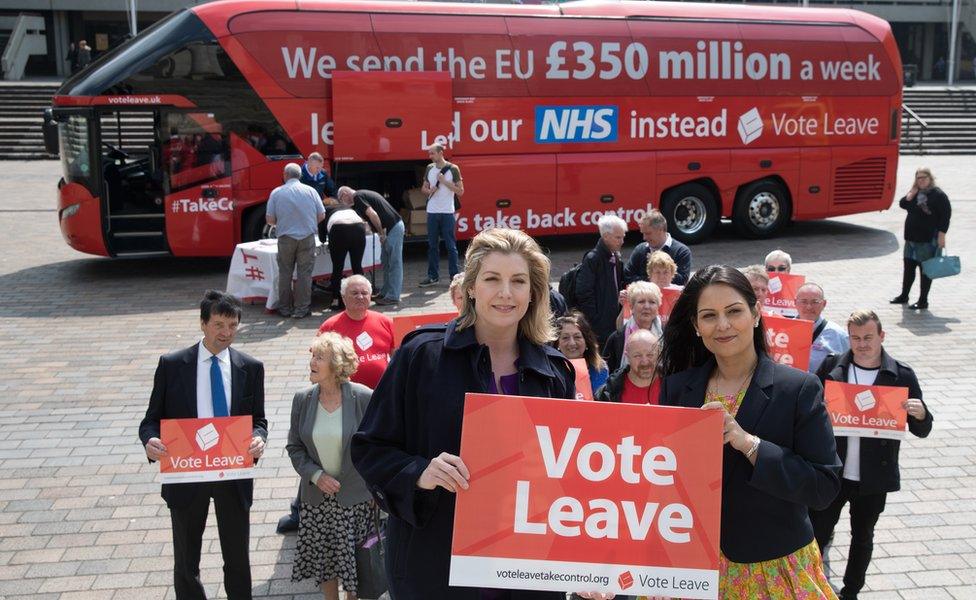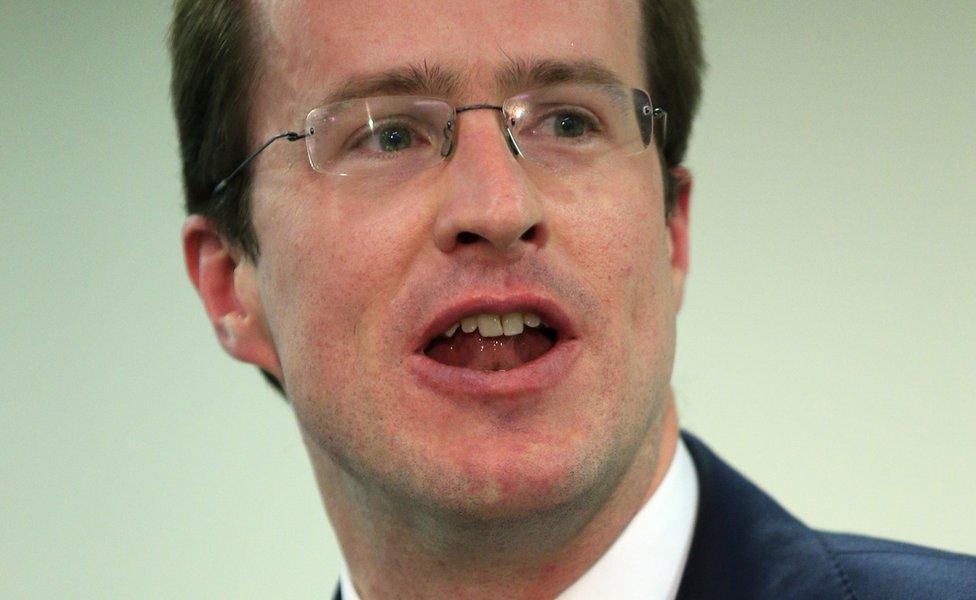EU referendum: The politics behind the £350m figure
- Published

From its earliest days the Vote Leave campaign believed that Britain's financial contributions to the EU would be one of its main trump cards during the referendum.
Over the summer of last year the campaign leadership took a decision which has dogged them to this day. They would highlight the overall, or gross, figure Britain contributes to the EU without taking account of the special rebate Britain receives back from the EU or billions of pounds in subsidies from Brussels.
The Vote Leave campaign therefore took out their calculators and used Britain's annual £18.8bn contribution to the EU in 2014 to give them one of their main campaign messages.
Divide £18.8bn by 52 and you come up with the figure of £350m, allowing the Vote Leave campaign to emblazon its campaign bus and literature highlighting the weekly figure the UK hands over to Brussels. The group has then said this money could be used to fund extra spending on public services such as the NHS.
On Monday night's special Newsnight programme examining "What Out looks like", however, it was striking that energy minister and leading Brexit campaigner Andrea Leadsom eschewed this formula referring instead repeatedly to a "£10bn independence dividend".
That figure represents her estimate of Britain's net contribution once the rebate and EU funding to the UK have been taken into account.
How does the rebate work? Evan Davis travels back in time to find out
On Wednesday morning the Institute for Fiscal Studies delivered another blow to the £350M a week figure in its report on the economic impact of Brexit, external. It said that £8bn, which takes account of the rebate and the subsidies, would be a more accurate annual figure of Britain's EU contributions.
Paul Johnson, the director of the IFS, told the Today programme on BBC Radio 4: "To have that £350m [per week] after we left the EU you would have to assume something rather bizarre which is we'd left, we stopped paying contributions and our current partners nevertheless continued to pay us a rebate on contributions that we weren't making. That is where you get £350m from."
These concerns are shared by some figures in the Vote Leave campaign. Key people in the campaign are not using the figure and are instead highlighting the £10bn figure cited by Leadsom.
"It's absolutely factual": Douglas Carswell defends the £350M figure
The source told me: "The £10bn is eye wateringly high so why exaggerate that? Dominic Cummings [the Vote Leave campaign director] insists on using the £350m figure on the grounds that an argument about future payments to the EU plays into Vote Leave hands. But that figure just detracts from the argument."
Newsnight understands that concerns have been raised internally at Vote Leave about the use of the £350m figure by the campaign. But Dominic Cummings has insisted that arguments about the £350m figure help by highlighting the fact that the UK pays a vast amount of money into EU coffers.
Polling and focus groups conducted by Vote Leave also suggest that the £350m figure is registering in the minds of voters.
There is another argument that is being used internally to defend the £350m figure which explains why Matthew Elliott, the Vote Leave chief executive, is so supportive.

Vote Leave chief executive Matthew Elliott is in favour of the use of the £350M figure
The campaign which successfully defeated a Liberal Democrat attempt to replace Britain's first-past-the-post voting system with the Alternative Vote (AV) system in a referendum in 2011 made great play of the costs. They said the new system would cost £250m, prompting scorn in some quarters.
But opponents of AV, who won an emphatic victory in the referendum, said that the £250m figure played well on the doortstep. Mathew Elliott masterminded that campaign as campaign director of of NOtoAV.
Nicholas Watt is political editor for BBC Newsnight. You can catch up on Newsnight's EU referendum specials here